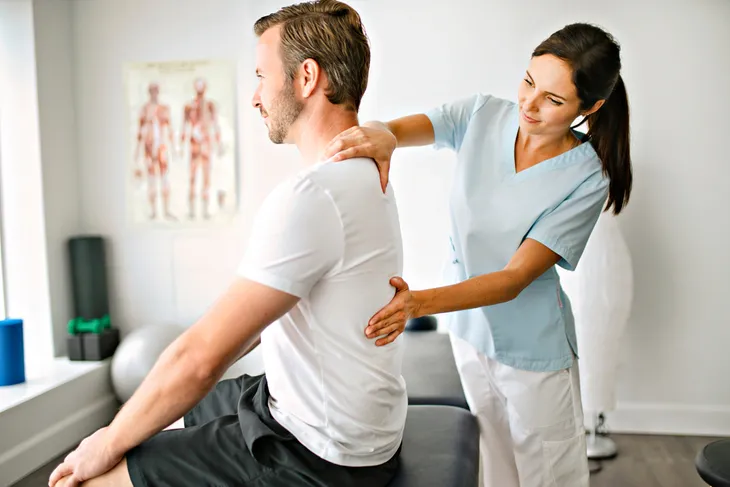Your neck has an important job of stabilizing the upper region of the body and it’s responsible for head movement, assisting in swallowing, and so much more. This is why taking care of your neck is essential. Unfortunately, many people experience neck pain occasionally and in most cases, it’s due to overuse or poor posture. Neck pain is also sometimes caused by an injury or can be a sign of a more serious health condition.
Experiencing neck pain is never fun and sometimes it can even interfere with your day-to-day task making it even more of an annoyance. Thankfully there are a variety of remedies you can try at home to get some relief. In this article, we dive into common symptoms that are associated with neck pain, common causes, as well as how to ease neck pain.
Common Symptoms of Neck Pain
Signs that you have neck pain include a stiff neck, soreness, and difficulty moving your neck. Neck pain can be localized to one spot or you may experience general soreness.
But neck pain may also cause other symptoms too. These include muscle tightness or spasm, trouble moving your neck or head, and a headache.
Common Causes of Neck Pain
Neck pain can happen for a variety of reasons. Some of the more common causes include muscle tension and strain which is usually caused by poor posture, jerking your neck the wrong way and bad sleeping habits.
Other causes of neck pain include repetitive motions, gritting your teeth, or carrying heavy items. Neck pain can also be caused by more serious medical conditions like tumors, fibromyalgia, or a sign of a heart attack.
When To See a Doctor
Neck pain is fairly common and can happen to anyone. Most cases aren’t a cause for concern and will improve over time with at-home treatment. However, there are some symptoms you should be on the lookout for. For starters, if your symptoms persist for longer than a week, then you should talk with your doctor.
Furthermore, if your neck pain is a result of an immediate injury such as a fall or motor vehicle accident, seek medical care immediately. Other symptoms that are a cause for concern and should be discussed with your doctor include:
- Severe pain without an apparent cause
- Fever
- Nausea and vomiting
- Trouble swallowing or breathing
- Swollen glands or a lump on your neck
- If the neck pain is accompanied by headache, numbness, weakness, or tingling.
- Bowel or bladder dysfunction
How To Ease Neck Pain
Neck pain can be excruciating and annoying, especially when it interferes with your day-to-day tasks. Thankfully, there are a variety of ways you can get some relief! These range from hot and cold compresses to pain relievers and lifestyle changes.
The effectiveness of these remedies will also depend on the root cause of your neck pain. Nonetheless, let’s explore the best ways to ease neck pain.
Cold and Hot Compresses
Cold compresses should be used for the first 24 to 48 hours after the pain starts. This will help reduce inflammation. To use a cold compress at home, you can use an ice-pack or fill a bag with ice cubes. Apply the cold compresses for 15-20 minutes a few times a day.
After that, you can use a hot compress. The heat will help loosen the muscle and improve stiffness in your neck. You can use a heating pad or try taking a warm bath or shower. If you have any bruising or swelling on or around your neck, hold off on using heat until that subsides.
Stretching
Stretching is a great way to relieve neck pain and stiffness. Stretching regularly can also help prevent neck pain in the future. Just be sure to stretch slowly and gently as you don’t want to cause more pain. Some great stretches include:
- Slowly turn your head from side to side and then up and down.
- Roll your shoulders forward in circular motions and then repeat backward.
- Squeeze your shoulder blades together and hold for a few seconds before releasing. Repeat several times.
Over-the-Counter Pain Relievers
Another way you can ease neck pain is by taking over-the-counter (OTC) pain relievers. You might want to consider nonsteroidal anti-inflammatory drugs (NSAIDs) like ibuprofen, or naproxen, as these will help with temporary pain relief but also help reduce inflammation. Acetaminophen is also a good option. Even though it isn’t an anti-inflammatory drug, it still may be able to provide temporary pain relief.
Like most medications, OTC pain relievers do have side effects. This is why you should always consult with your doctor to ensure they don’t interfere with any other medications you might be taking. It’s also important to not take more than the recommended dosage.
Limit Your Smartphone Usage
Most people have smartphones and while they are convenient, they can wreak havoc on your neck muscles, especially if you’re consistently looking down at your phone. If you have neck pain and continue to use your phone the same way, this can cause added strain and pain. So try to limit your smartphone usage.
The good news is there are ways you can use your phone without causing neck strain. For starters, you can hold your phone at eye level. Don’t hold your phone between your shoulder and ear and instead use headphones for phone calls. Further, it would also be helpful to take frequent breaks from your phone and stretch after using it.
Change Your Sleeping Position
How you sleep at night can also affect your neck. Poor sleeping habits can cause neck pain and it can make your pre-existing neck pain worse if your poor habits aren’t corrected. Try sleeping on your side or back as this will put less strain on your neck compared to your stomach.
Sleeping on your stomach can cause your neck to strain for longer periods of time and result in more pain and stiffness. You should also consider making adjustments to your sleep environment. This includes sleeping on a firmer mattress, using a neck pillow, relaxing before bed, and wearing a mouthguard if you grind your teeth.
Other Remedies To Consider
Other remedies for neck pain you should also consider include getting a massage by a trained practitioner. This should help loosen and stretch your neck and the muscles in your back. You might also want to consider going to a licensed chiropractor as they can manipulate muscles and joints to provide pain relief.
Finally, you may also want to consider acupuncture. This involves inserting needles into specific pressure points which may provide some relief for your neck pain. Make sure you only visit a certified practitioner.
How To Prevent Neck Pain
Experiencing neck pain once is enough to make you not want to experience it again. Thankfully there are a variety of things you can do to help prevent neck pain in the future. For starters, you’ll want to practice good posture. When you’re sitting and standing ensure your shoulders are in a straight line over your hips and that your ears are directly over your shoulders.
Further, take frequent breaks from sitting and stretch your neck and shoulders. Avoid tucking your phone between your ear and shoulder, avoid carrying heavy bags over your shoulders, sleep in a good position, and ensure your workstation is ergonomic. All of these best practices will help prevent neck pain in the future!














